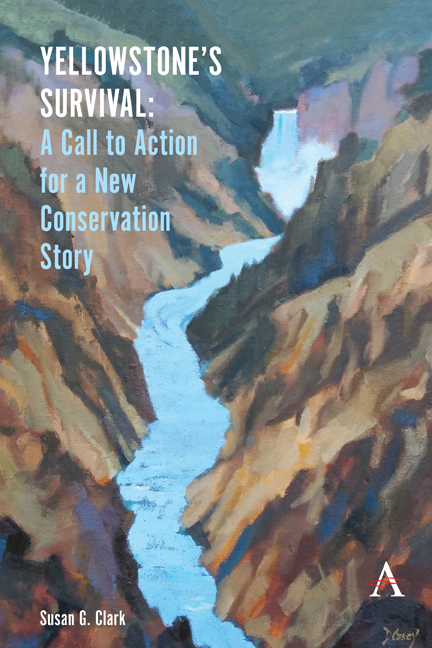 Yellowstone's Survival - A Call to Action for a New Conservation Story
Yellowstone's Survival - A Call to Action for a New Conservation Story 5 - Controversy and Society
Published online by Cambridge University Press: 22 May 2021
Summary
In conservation we have always assumed a dialogue between ourselves
and everyone else; a civilized adversary proceeding in which reason,
logic, and the meticulous argument, liberally laced with horrible precedent,
would persuade just men and women to our position.
We have invested enormously in that assumption.
Unfortunately for reasons and logic, for ourselves, and for wildlife,
it has not worked. One would like to know why.
One evening in the summer of 2014, I was driving in Grand Teton National Park. In the fading light, I spotted a medium-sized grizzly bear eating in the sagebrush just 50 feet from the road and about 150 feet from a bike path. Fortunately, no bikers were on the path that evening. The next morning when I passed the same spot, the bear was gone, but several bikers were speeding up from Cottonwood Creek, only a short distance from where the bear had been just 12 hours earlier. What if those bikers had zipped past an unsuspecting grizzly? Would it have triggered a defensive response? Bikers have tragically been killed by grizzlies elsewhere. Given the potential for and danger of such a situation, why is there a recreational bike path in grizzly bear country at all?
Debate about recreation in national parks is just one example of the long-standing controversy about what values take precedence in deciding how we use resources and how we relate to nature. Society is conflicted over what parks and public lands are for, what our own behavior ought to be, and especially about what our responsibilities are to wildlife and nature. Are parks and other public lands just places for human recreation or are they something more? What do our present attitudes and behaviors— our mental level— suggest about the importance of the GYE's wildlife and future to us? Let's examine the sociology of our situation as it offers insight into our society, its culture, and institutions, as well as our individual behavior and “mental configurations.”
To gain insight into these subjects and the cases of interest to you, this chapter focuses on the most dominant species in the GYE— humans and our mental level. First, I look at controversy and conflict in society using a case study approach.
- Type
- Chapter
- Information
- Yellowstone's Survival - A Call to Action for a New Conservation StoryA Call to Action for a New Conservation Story, pp. 109 - 134Publisher: Anthem PressPrint publication year: 2021
